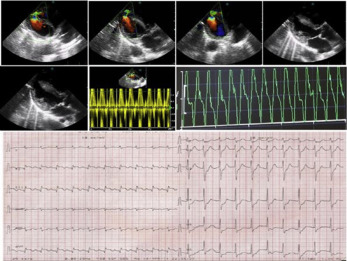Post myocardial ventricular septal defects are rare but highly lethal complications of myocardial infarctions. So they are less common compared to the free wall perforation which reported approximately 1-2% in autopsy studies. The death may be occured especially in the early phase of myocardial infarctions and are associated with poor hemodynamic and right ventricular dysfunction. The inferoposterior myocardial infarction related ventricular septal defect results from ischemic damage or infarction of the right ventricle due to stenosis or occlusion of the right coronary artery system. The prognosis of these cases remains extremely poor, and surgical or percutaneous defect closure are therapeutic options for improving survival. We present a case of a 71-year-old man who admitted with a subacute posteroinferior myocardial infarction complicated by a ventricular septal rupture with 13 mm width. He had typical chest pains that had persisted for three days so he was diagnosed subacute inferior and posterior myocardial infarction. There are chronic obstructive lung disease and hypertension on his previous history. There were bilateral inspiratory ralles tachycardia, hypotension and loud murmur over the whole heart on his physical examination. His hemodynamic condition was poor and remained with low cardiac output state and so an intra-aortic balloon pump and emergency angiography were planned but the patient and his family did not accept. Transthoracic echocardiography revealed a 13 mmm postero-apical ventricular septal defect and akinesia of the ventricular apex and inferoposterior segment. Pulmonary artery systolic pressure was 60 mmHg. There were also severely dilated right ventricle, paradoxic interventricular septal movement and severely reduced global left ventricular function.
A decision was made to perform a emergent surgical repair but the patient did not accept any coronary intervention and surgical therapy and we have to apply conservative treatment including positive inotropic support with dopamin and dobutamine. But the patient was died at day three post myocardial infarction. In conclusion, this case was a late admission of inferoposterior myocardial infarction caused rupture of very large segment of the apical portion of the interventricular septum.





